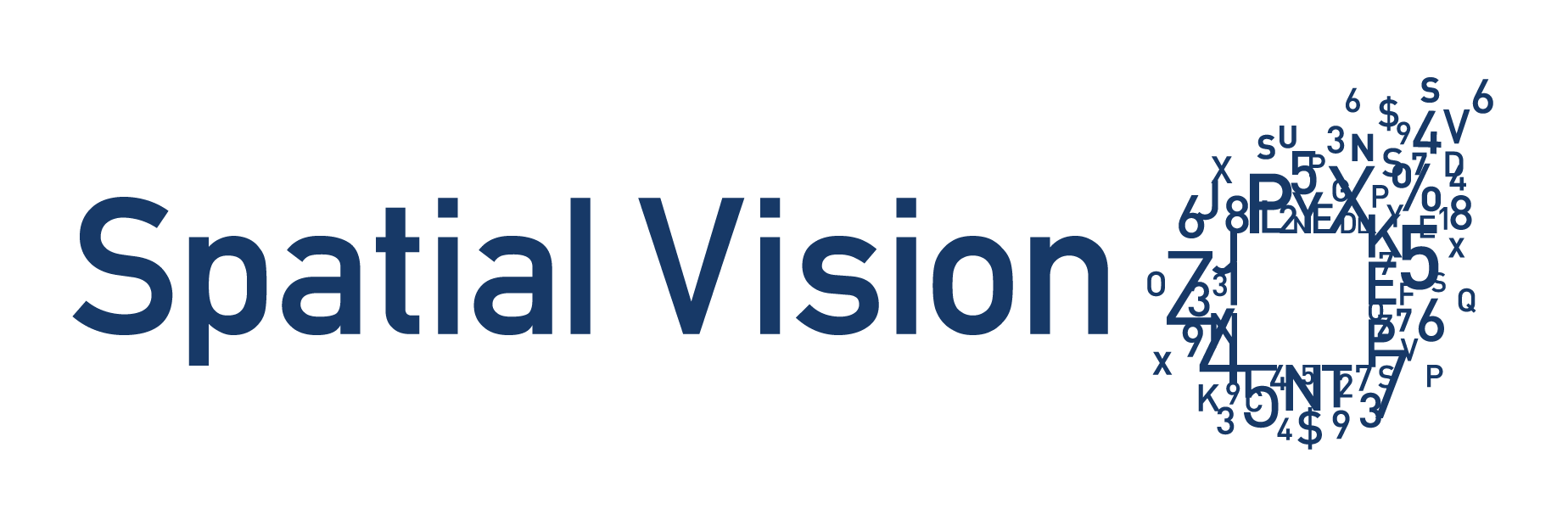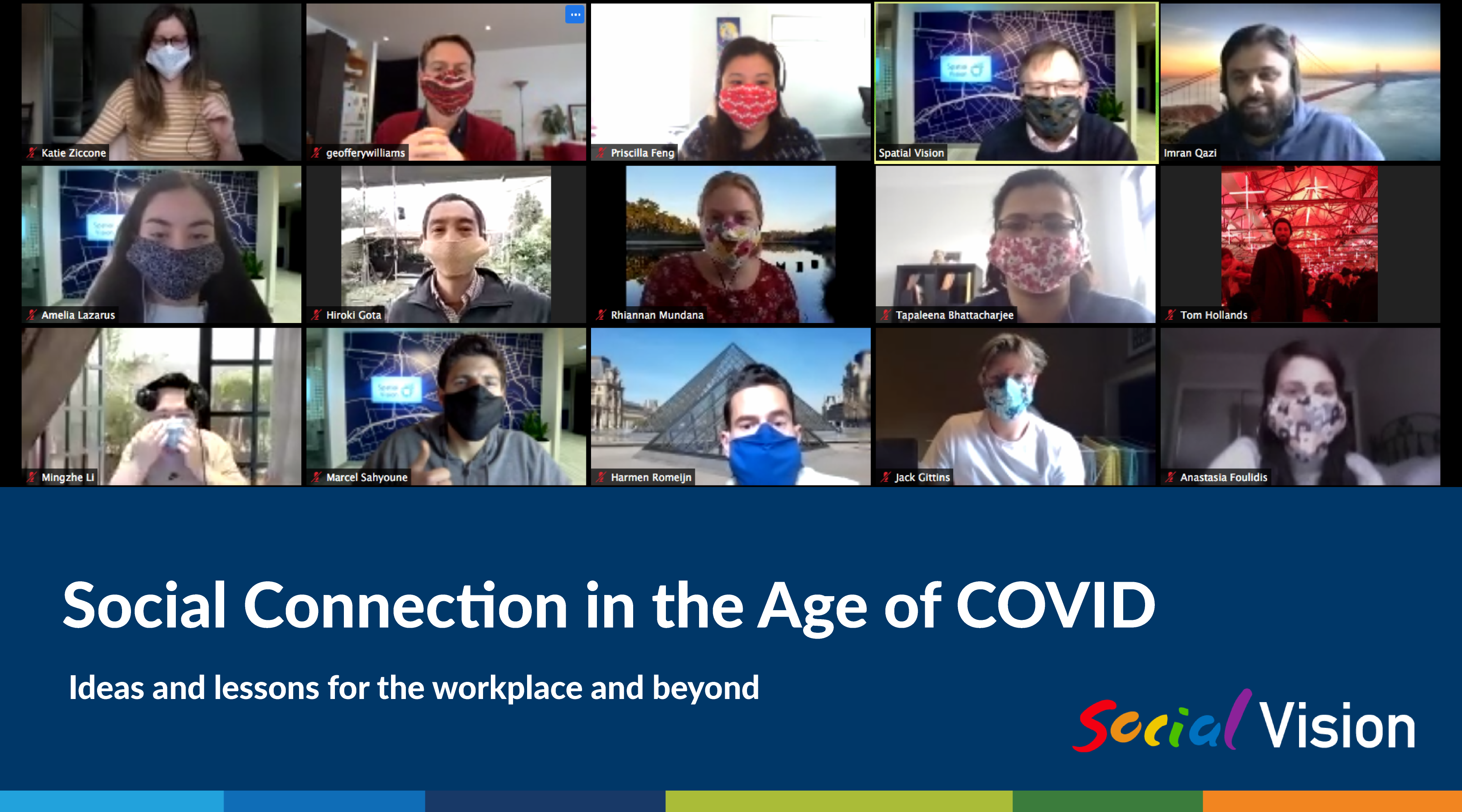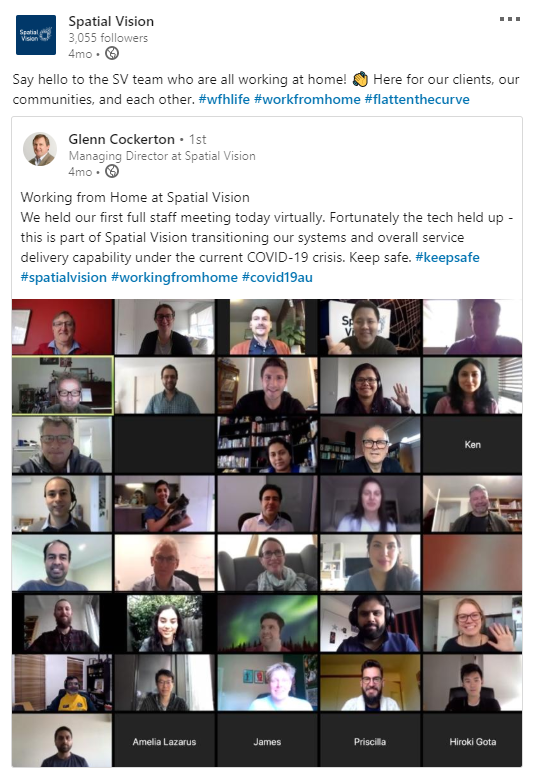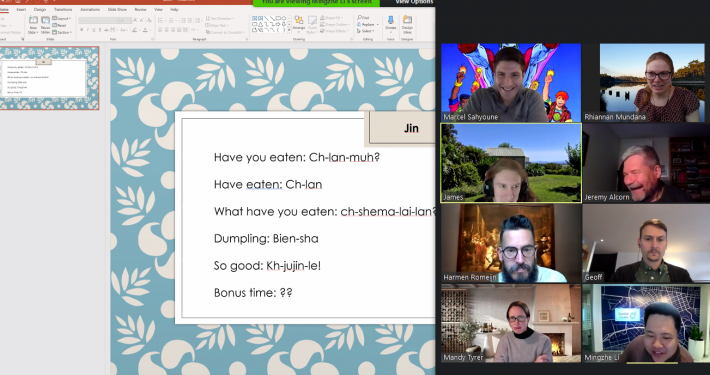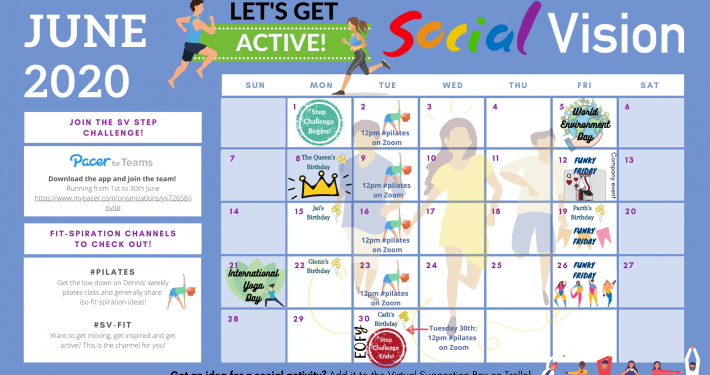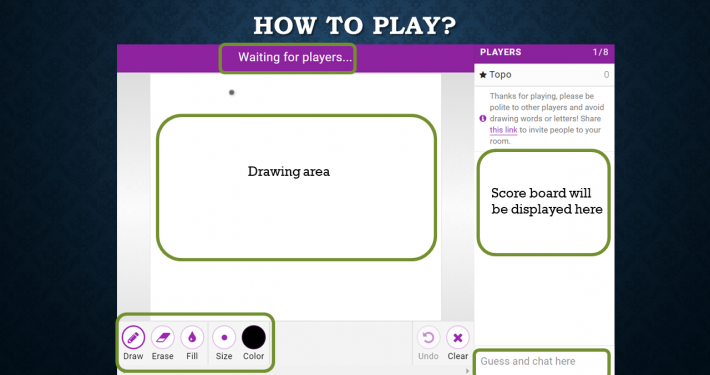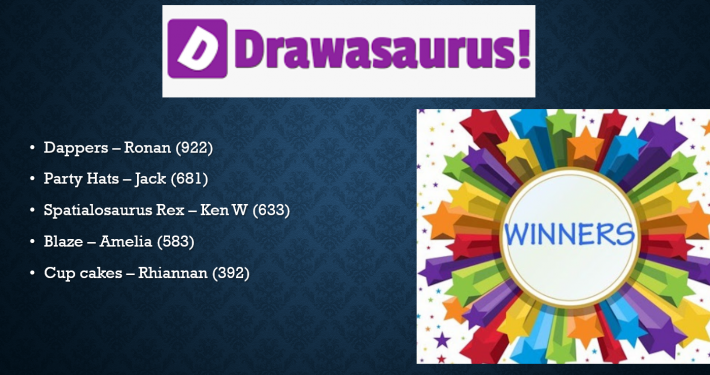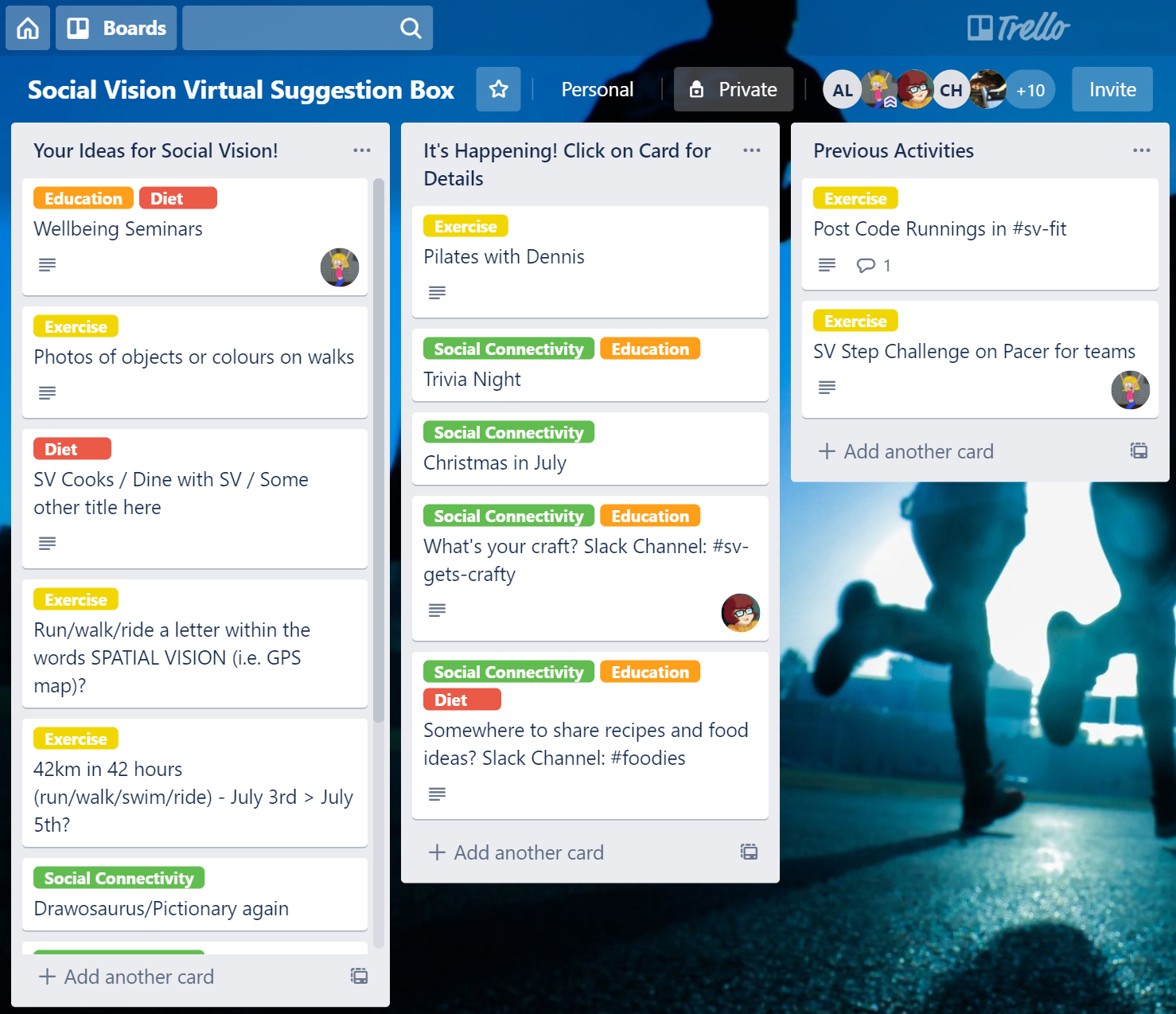A few months before COVID19 really hit, one of our staff members Rhiannan Mundana and I were chatting in the kitchen about how great it would be if Spatial Vision had a social club. Rhi wanted to see more connection across teams beyond the standard Friday drinks, lunchtime crosswords and the odd (very competitive) table tennis tournament.
Armed with activity ideas, input from her teammates, and a catchy name to boot, my only reaction was “Yes! We should totally do that!”. With excited minds we were all set to begin our culture building journey…
And then COVID happened.
As with many organisations, working from home went from a flexibility privilege to an essential mandate to keep our business moving, our people employed, and our customers satisfied. The first few weeks involved discussions around risks, productivity and cashflow whilst making sure home offices were practical and safe with meetings and collaboration sessions navigated successfully – all of the practical “business” stuff. And then it struck us.
What about our culture?
How do we keep people connected while the world comes to a halt? Beyond that, how do we ensure everyone’s health and wellbeing is maintained?
From parents schooling their kids at home to those of us living alone, there were many considerations for how we could offer support in such difficult times.
My first instinct was to dive into research mode – I looked to my networks, read blogs, articles, heck – I even went back to my uni notes for ideas on how we should approach a scenario when “best practice” didn’t exist yet.
And then I realised the answers were right in front of me. We needed to make Rhi’s social club idea a reality – a ‘virtual’ one.
As with many organisations, working from home went from a flexibility privilege to an essential mandate to keep our business moving, our people employed, and our customers satisfied. The first few weeks involved discussions around risks, productivity and cashflow whilst making sure home offices were practical and safe with meetings and collaboration sessions navigated successfully – all of the practical “business” stuff. And then it struck us.
What about our culture?
How do we keep people connected while the world comes to a halt? Beyond that, how do we ensure everyone’s health and wellbeing is maintained?
From parents schooling their kids at home to those of us living alone, there were many considerations for how we could offer support in such difficult times.
My first instinct was to dive into research mode – I looked to my networks, read blogs, articles, heck – I even went back to my uni notes for ideas on how we should approach a scenario when “best practice” didn’t exist yet.
And then I realised the answers were right in front of me. We needed to make Rhi’s social club idea a reality – a ‘virtual’ one.
I then reached out to team leaders requesting one person from each team join a committee. Rhi was obviously in, and we were quickly joined by Mingzhe, Tapaleena and Jack. Together we represented every team in the business and thus, Social Vision was born.

The Social Vision logo we created incorporating each of the six teams’ colours
The five of us got to brainstorming ideas around five identified factors of wellness (my research came in handy after all): Social Connectivity, Exercise, Education, Diet and Sleep. We each reached out to our respective teams and created a virtual whiteboard of ideas. The ideas ranged from a meditation and sleep app and a step challenge, to a virtual space dedicated to sharing pictures of our pets (a clear crowd favourite), learning more about and celebrating our company’s cultural diversity and hosting online company events with Trivia and Pictionary.
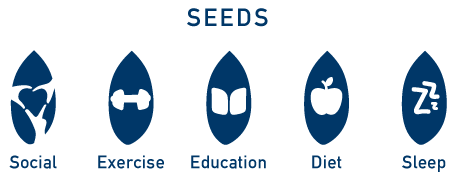
Funky Friday
The first initiative we rolled out was Funky Friday – another brainchild of Rhi’s and the extension of an activity our Mobile Apps & IT team had done in their first few weeks at home. Because every day seemed like casual Friday now, Social Vision would set a theme each Friday to challenge our teams #creativity and dress up to the theme with what they had at home. It was a such a simple idea and since introducing Funky Friday, we all end our week laughing and learning a little more about our colleagues (particularly about what people have in their cupboards!). We share our team photos showcasing our creative skills and everyone votes for their favourite team (which always seems to be our Mapping Products and Services team who are the most creative bunch of people you’ll ever meet!) and one person who is crowned the week’s “creative genius”.
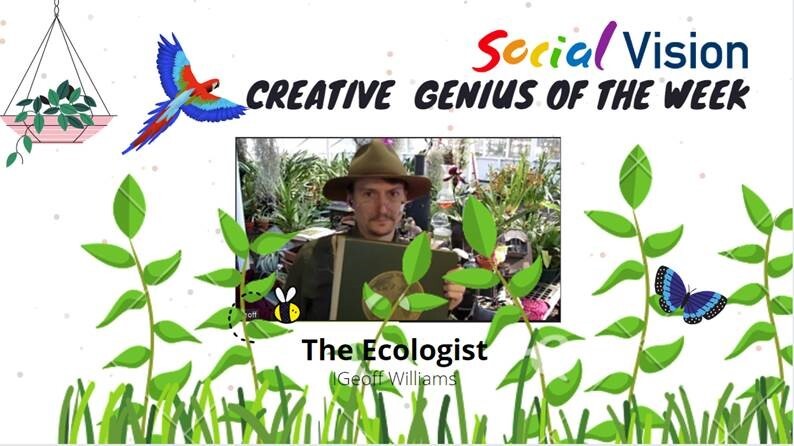
One thing we were sorely missing was interaction across different teams in the business. Whether it was casual chats at the coffee machine or the banter from completing the daily crossword in the kitchen, this was an important part of in-office culture that had disappeared. So Social Vision’s next task was to find an activity that could encourage these casual connections outside of work.
Trivia Night
We picked a team-based Trivia Night and lined up an external company to run it for us. Whilst there was a fee attached for the external company, the event was a great success and we have run the activity many times since! The first event we organised was in teams of two, and the second made use of Zoom’s break out room function so we could have five people in a team. Both events were engaging, fun and challenged our trivia brains! But more importantly, we’ve created new memories with our colleagues and found a new activity that will be a lasting part of our culture.

Other initiatives
Since the initial success of Funky Fridays and Trivia Night, Social Vision has organised Culture Week which focused on learning new languages, exploring the culinary delights of our cultures and increasing awareness of the rich diversity of our team. We’ve also organised a number of initiatives aimed at keeping people active like our Active June Step Challenge and Postcode Runnings which was actually driven by two of our (particularly fit!) staff members Marcel and Harmen. Tapaleena also introduced Virtual Coffee Breaks using a Slack app named Donut that randomly pairs two people each week to encourage more casual connections.
